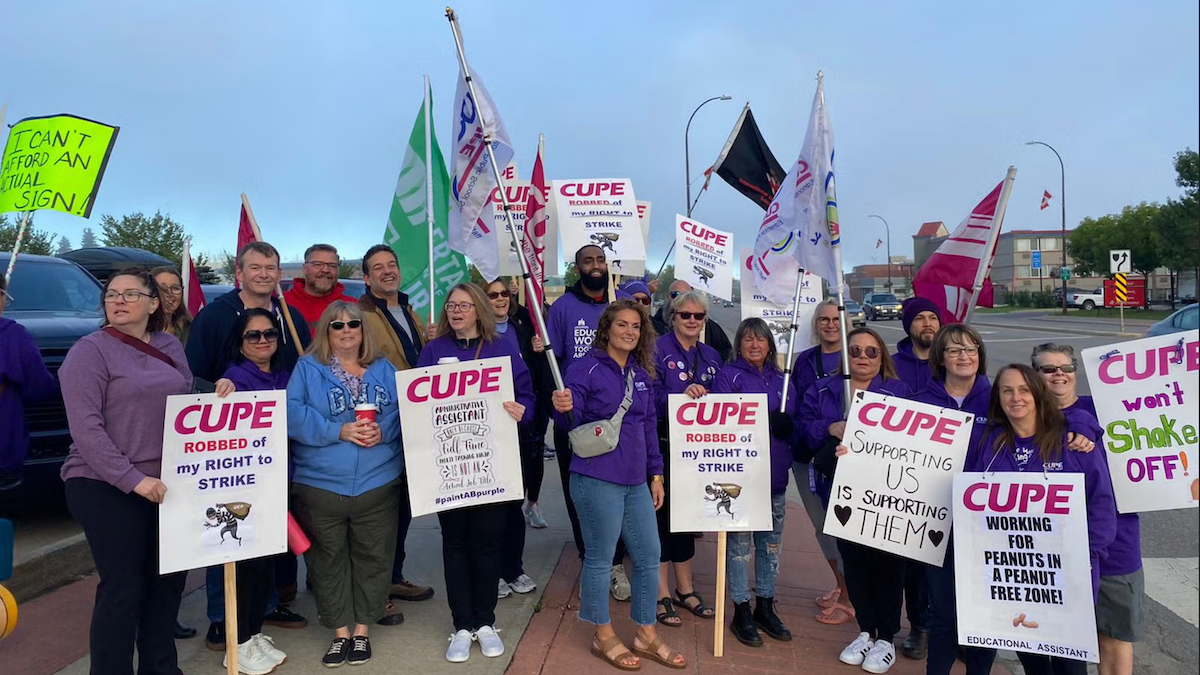There’s a reason that Danielle Smith publishes an angry statement demanding Ottawa interfere with the collective bargaining process practically every time there’s a labour dispute in federal jurisdiction, and it goes beyond the conservative movement’s urgent desire to score points against Prime Minister Justin Trudeau.
Alberta’s premier is sending a signal her United Conservative Party (UCP) will not tolerate strikes on its own turf, regardless of the constitutional rights of Alberta workers to full collective bargaining, says Rory Gill, president of CUPE Alberta.
In a season when multiple public-sector unions are negotiating with the province, Gill warned yesterday, this foreshadows a significant potential attack on workers’ rights in Alberta.
A statement published on the Alberta Government website last Wednesday, complaining about the strike by grain elevator workers that commenced the day before in Vancouver, is the latest example of this increasingly common phenomenon.
“The federal government must improve its approach to labour relations, particularly in federally regulated transportation sectors,” huffed the statement, attributed to Smith, Agriculture Minister RJ Sigurdson, Trade Minister Matt Jones, and Transportation Minister Devin Dreeshen, a mighty ministerial lineup if ever there was one!
“The continuous strikes we have seen are a direct result of these failed relations and must be urgently addressed to restore stability in our supply chains,” the foursome complained.
“That is why Alberta’s government has sent a letter continuing to call on the federal government to respond proactively and more effectively to labour disputes that have potential to create widespread damage to critical supply chains, as well as to our country’s economy and reputation as a reliable trading partner,” it concluded, as if a letter were a resounding shot across Ottawa’s bow.
The statement also squawked about China’s investigation into the claim Canadian canola seed imports are being dumped in that country – that is, sold for less than the cost of production – but didn’t note that action is thought to be a reaction to Ottawa’s planned 100-per-cent tariff on Chinese made electric vehicles, a policy you’d think the climate-action opposing UCP would support.
Regardless, Wednesday’s official commentary was far from unique. Indeed, the only thing unusual about it was that it was published after the strike began. Normally, when the province demands Ottawa block one of the few effective measures that can be taken by working people to break an impasse in negotiations, they do it as soon as there’s a whiff of a labour dispute in the air.
But no matter how much the UCP hates it that working people have the right, now enshrined in constitutional law, to bargain collectively and effectively, the prospect of an extended strike concentrates the hive mind of a corporate C-suite wonderfully, usually leading swiftly to an agreement everyone can live with.
Smith and company demanded Ottawa interfere in the B.C. port strike in the summer of 2023.
They demanded Ottawa declare the WestJet mechanics strike illegal in July this year. The feds didn’t, and an agreement was quickly reached.
They demanded the same thing when negotiations between workers at both Canadian Pacific and Canadian National railways looked as if they were about to go off the rails in August.
Ditto when it looked like Air Canada’s pilots might set up picket lines earlier this month. Ms. Smith took to social media to demand Ottawa step in – with a link to the employer’s PR spin.
“What the Alberta government has demonstrated is an abhorrence of strikes,” Gill told AlbertaPolitics.ca, never mind the law or the rights of workers. “Any kind of labour dispute anywhere in the country, she has weighed in.”
Enter the Canadian Union of Public Employees’ under-paid school members employed by the public and Catholic school boards in Fort McMurray. With negotiations at an impasse, about 1,000 educational assistants, school maintenance staff, librarians, IT workers and others voted to strike on September 12.
Give collective bargaining a chance to work? Not a chance! On September 16, the day before the strike was scheduled to begin, the UCP Government stepped in with a Dispute Inquiry Board, a venerable provision of Alberta’s Labour Code used to prevent strikes that workers have a chance of winning, to force the workers to stay on the job for 30 days.
This, of course, immediately defuses the strike threat to the employers’ advantage.
“The Smith government has demonstrated its total disregard for workers, their rights, and their aspirations for improving the quality of education for Fort McMurray students,” a furious Gill said on the day the DIB was announced. “They can pre-empt tomorrow’s strike action, but they can’t destroy the solidarity that CUPE education workers have built in their preparations for this strike.”
If the Fort Mac workers issue another strike notice after the 30-day delay, Gill said yesterday, “I have no doubt” the government will try to find something else to block the workers.
“This government does not believe in workers’ rights, no matter what they say about supporting the little guy,” he concluded.



